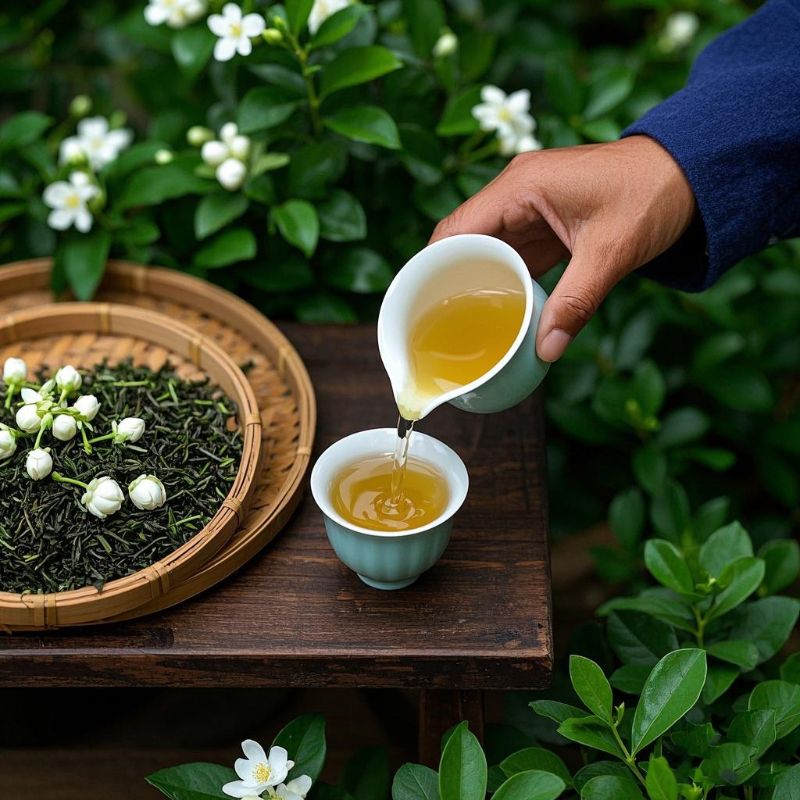Jasmine Tea for Anxiety

In today’s fast-paced world, anxiety has become a common companion for many. While there are various ways to address it, more people are turning to natural remedies like jasmine tea for anxiety. This fragrant beverage has been used for centuries in traditional medicine, and modern research is now shedding light on its calming properties. Let’s explore how jasmine tea for anxiety works, its benefits, and how to incorporate it into your daily routine.
The Science Behind Jasmine Tea for Anxiety Relief
The use of jasmine tea for anxiety isn’t just a tradition; it’s backed by science. Jasmine flowers contain compounds that have a soothing effect on the nervous system. One of the key components is linalool, a natural compound found in many flowers and herbs. Linalool has been shown to reduce stress and anxiety in several studies, making it a crucial factor in why jasmine tea for anxiety is so effective.
Additionally, jasmine tea is often made from green tea leaves, which contain l-theanine. This amino acid is known for its ability to promote relaxation without drowsiness. The combination of linalool from the jasmine flowers and l-theanine from the green tea creates a powerful blend that targets anxiety from multiple angles. This is why many people turn to jasmine tea for anxiety when they need a natural way to calm their minds.
How to Brew the Perfect Cup of Jasmine Tea for Anxiety
Brewing jasmine tea for anxiety correctly is essential to maximize its calming benefits. Start by choosing a high-quality jasmine tea. Look for loose-leaf varieties if possible, as they tend to have a stronger flavor and more beneficial compounds than tea bags.
To brew, heat water to around 180°F – 190°F. Boiling water can be too hot and may extract bitter compounds from the tea leaves, affecting the taste and potentially reducing the calming effects. Place the tea leaves in a teapot or cup, pour the warm water over them, and let steep for 3-5 minutes. Steeping for too long can also lead to a bitter taste, so be mindful of the time.
Drinking jasmine tea for anxiety in a relaxed setting can enhance its effects. Find a quiet place, sip slowly, and focus on the aroma and taste. The act of taking time to enjoy your tea can itself be a form of mindfulness, adding to the anxiety-relieving benefits.
Jasmine Tea for Anxiety: Comparing It to Other Remedies
When looking for natural anxiety remedies, many people consider options like chamomile tea, lavender, or even green tea. How does jasmine tea for anxiety stack up against these?
Chamomile tea is well-known for its calming properties, and it’s a great option for those looking to relax. However, jasmine tea for anxiety offers a different flavor profile and a unique combination of compounds. The linalool in jasmine flowers has been shown to have specific anxiety-reducing effects, while chamomile relies more on apigenin, another calming compound.
Lavender is often used in aromatherapy for anxiety, and its scent can be very soothing. Jasmine tea for anxiety combines the benefits of both ingestion and aromatherapy, as the scent of the jasmine flowers can have a calming effect even before you take a sip.
Green tea, while beneficial in many ways, contains more caffeine than jasmine tea. While the l-theanine in green tea does help to balance the stimulating effects of caffeine, jasmine tea for anxiety may be a better choice for those sensitive to caffeine or who prefer a beverage with a milder stimulant effect.
Incorporating Jasmine Tea for Anxiety into Your Routine
There are many ways to incorporate jasmine tea for anxiety into your daily life. One of the simplest is to make it a part of your morning or evening routine. Drinking a cup of jasmine tea in the morning can help set a calm tone for the day, while having it in the evening can help you unwind after a stressful day.
Another way to use jasmine tea for anxiety is to combine it with other relaxing practices. Try drinking a cup while practicing deep breathing exercises, meditation, or yoga. The combination of these activities with the calming effects of jasmine tea can create a powerful anxiety-relieving routine.
You can also get creative with jasmine tea for anxiety by using it in recipes. Try making jasmine tea-infused desserts, like a jasmine tea panna cotta, or use it to make a calming cocktail or mocktail. The possibilities are endless, and incorporating jasmine tea into your favorite recipes can be a fun way to enjoy its benefits.
What the Research Says About Jasmine Tea for Anxiety
Several studies have looked into the effects of jasmine tea for anxiety, and the results are promising. One study found that the scent of jasmine flowers can reduce stress and anxiety in people performing stressful tasks. Another study looked at the effects of drinking jasmine tea and found that it can help reduce anxiety and improve mood.
While more research is needed to fully understand the mechanisms behind jasmine tea for anxiety, the existing studies provide valuable insights into its potential benefits. The combination of linalool and l-theanine, along with the relaxing ritual of drinking tea, makes jasmine tea a compelling natural remedy for anxiety.
Potential Side Effects and Considerations
While jasmine tea for anxiety is generally considered safe, there are a few things to keep in mind. As mentioned earlier, jasmine tea is often made from green tea, which contains caffeine. If you’re sensitive to caffeine or trying to avoid it, look for decaffeinated jasmine tea options.
Additionally, if you have any allergies, especially to flowers like jasmine, it’s important to exercise caution. Some people may experience allergic reactions to jasmine, so it’s a good idea to start with a small amount and see how your body reacts.
Finally, while jasmine tea for anxiety can be a helpful part of an anxiety management plan, it’s not a substitute for professional medical advice. If you’re dealing with severe anxiety, it’s important to consult with a healthcare provider to develop a comprehensive treatment plan.
In conclusion, jasmine tea for anxiety offers a natural, flavorful, and research-supported way to calm the mind and relieve stress. Whether you enjoy it as part of your daily routine, combine it with relaxing practices, or get creative with it in the kitchen, incorporating jasmine tea into your life can be a simple and effective way to manage anxiety. So why not pour yourself a cup, sit back, and let the soothing power of jasmine tea help you find your calm?
Anchor text: Learn more about the benefits of linalool for anxiety here
Anchor text: Discover more about natural anxiety remedies here

